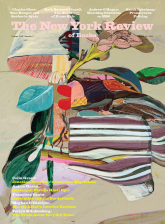In response to:
Life, Death, This Moment of June from the December 8, 2022 issue
To the Editors:
One of the curious facts about Virginia Woolf’s writing is that on several occasions she published quite different versions of her novels in the UK and the US. Edward Mendelson [“Life, Death, This Moment of June,” NYR, December 8, 2022] points out that Merve Emre has taken it upon herself to create a version of Mrs. Dalloway that exists nowhere outside Professor Emre’s imagination (but now given concrete form by her publisher, who we have to assume also cares little for Woolf’s own decisions about her work). There are significant textual differences in other Woolf novels, such as, for example, in To the Lighthouse, where the first section (“The Window”) ends:
“Yes, you were right. It’s going to be wet to-morrow.” She had not said it, but he knew it. And she looked at him smiling. For she had triumphed again.
In the American edition, this passage reads:
“Yes, you were right. It’s going to be wet to-morrow. You won’t be able to go.” And she looked at him smiling. For she had triumphed again. She had not said it; yet he knew.
Editors have long drawn attention to these differences, some large, as above, some very small matters of punctuation. It seems to me more interesting, as well as more honest, to ponder why Woolf corrected and revised her English and American proofs so differently than to charge ahead with one’s own preferred readings.
Mark Hussey
General Editor, Harcourt Annotated Edition of the Works of Virginia Woolf
Editorial Board, Cambridge Edition of the Works of Virginia Woolf
Nyack, New York
To the Editors:
Near the end of his generally admirable essay on Virginia Woolf’s Mrs. Dalloway, Edward Mendelson writes:
One of the ways Woolf made Mrs. Dalloway more profound and more disturbing than its model Ulysses was by adding Septimus [Smith]’s chosen death. No one in Ulysses is threatened with death; the deaths that occurred in the past were all natural ones.
Whether or not Woolf took as her model a novel that she ultimately thought “pretentious,” “underbred,” and “a mis-fire” (diary for September 6, 1922), it is hardly true to say that the deaths recalled in Ulysses were “all natural.” While Stephen’s mother died of cancer and Bloom’s son Rudy died in infancy, Bloom is repeatedly haunted by the memory of his father’s suicide.
James Heffernan
Professor of English Emeritus Dartmouth College
Hanover, New Hampshire
Edward Mendelson replies:
Mark Hussey makes an important point, but the question of why Virginia Woolf made different revisions in her American and British proofs may have a straightforward answer. She corrected the American proofs first because they needed a week to cross the Atlantic by sea, and then the American publisher needed time to reset the type for the American market. She corrected the British proofs later, and, like every writer correcting a later proof, she revised her text to bring it closer to what she wanted to say; her later revisions may have included her second thoughts about earlier ones. So an editor need not “charge ahead with one’s own preferred readings,” but can use the reading that Woolf, in her final revisions, preferred.
About the difference between the American and British endings to the first section of To the Lighthouse, it’s possible to guess that the British version rearranges the phrases, placing “triumphed again” at the end, in order to emphasize that the whole episode, ending in Mrs. Ramsay’s triumph, occurs in Mrs. Ramsay’s head. She imagines that her husband has silently asked her to tell him she loves him, and she imagines she has triumphed by letting him know this without yielding to his demand for words. But she merely imagines these things, and this is slightly less evident in the American text, which makes it easier for a reader to suppose that the final phrase, “yet he knew,” is a factual report by the narrator, not an indirect report of Mrs. Ramsay’s satisfying fantasy.
James Heffernan is right about Bloom’s father, who killed himself. The general point that my piece made about Ulysses remains true: almost everyone in Joyce’s book is preoccupied by deaths that occurred to other people in the past, but no one confronts the more unsettling prospect of his or her own death. All the main characters in Mrs. Dalloway do exactly that.
Ulysses is the less disturbing of the two books in another and more subtle way. Unlike Mrs. Dalloway, it flatters its readers by inviting them to identify with Leopold Bloom, who makes absurd mistakes and feels unhappy about many things, but, unlike real human beings, has never done anything that he morally regrets. (His exchange of erotic letters and his masturbation are not moral faults.) Joyce invites his readers to imagine, “No one understands me, and I bump into the furniture at night, but I am morally perfect.” Another way in which the book flatters its readers, whether or not Joyce intended it, is that many readers so obviously feel complacent for having read it.
Mrs. Dalloway, in contrast, by portraying Clarissa’s purgatorial quest, invites its readers to make an unflattering purgatorial quest of their own.



